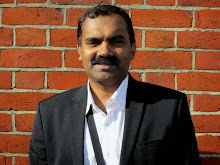 Well, Scenarios can’t predict the future. In a dynamic world where complex systems interact with each other in chaotic ways, no human can ever attempt to do that. But still, as my Grand father did, it mentally prepares one to take on a sudden development. At a time where response times will be too short, a prior thinking about such a situation will definitely put one in lead.
Well, Scenarios can’t predict the future. In a dynamic world where complex systems interact with each other in chaotic ways, no human can ever attempt to do that. But still, as my Grand father did, it mentally prepares one to take on a sudden development. At a time where response times will be too short, a prior thinking about such a situation will definitely put one in lead.
Scenarios can’t predict the future, so what’s the point?
 Well, Scenarios can’t predict the future. In a dynamic world where complex systems interact with each other in chaotic ways, no human can ever attempt to do that. But still, as my Grand father did, it mentally prepares one to take on a sudden development. At a time where response times will be too short, a prior thinking about such a situation will definitely put one in lead.
Well, Scenarios can’t predict the future. In a dynamic world where complex systems interact with each other in chaotic ways, no human can ever attempt to do that. But still, as my Grand father did, it mentally prepares one to take on a sudden development. At a time where response times will be too short, a prior thinking about such a situation will definitely put one in lead.
Does Chaos Theory have some role in Scenario Planning
 Sensitive dependency on initial conditions is an interesting way to think about possible futures.
The below quote seems interesting too
“In fact, the mere act of opening the box will determine the state of the
cat, although in this case there were three determinate states the cat
could be in: these being Alive, Dead, and Bloody Furious.”
― Terry Pratchett, Lords and Ladies
Sensitive dependency on initial conditions is an interesting way to think about possible futures.
The below quote seems interesting too
“In fact, the mere act of opening the box will determine the state of the
cat, although in this case there were three determinate states the cat
could be in: these being Alive, Dead, and Bloody Furious.”
― Terry Pratchett, Lords and Ladies
As i begin my mOOC journey with the University of Canterbury and OER Foundation
 My interest in the course goes beyond a personal level as i am currently initiating a large programme
meant to impart a new vigour to the Higher Education of the Kerala State through the 'Fostering linkages
in Academic Innovation and Research' (FLAIR). FLAIR is an attempt to make the higher education in the highly
literate state of Kerala future ready and its my sincere hope that my exposure to this cutting edge course
will definitely help me deliver more.
My interest in the course goes beyond a personal level as i am currently initiating a large programme
meant to impart a new vigour to the Higher Education of the Kerala State through the 'Fostering linkages
in Academic Innovation and Research' (FLAIR). FLAIR is an attempt to make the higher education in the highly
literate state of Kerala future ready and its my sincere hope that my exposure to this cutting edge course
will definitely help me deliver more.
#SP4Ed (2013.05) Scenario Planning for Educators - mOOC starts today
 Scenarios deal with a complex set of interrelated factors which typically play out over a considerable period of time.
“ It’s easy to get lost in the ‘trees’ of these details and lose sight of the ‘forest’ — mastering the dynamic complexity essential to successful strategy. Here’s where the discipline of systems thinking finds its greatest advantage. By using the systems archetypes we can learn how to ‘structure’ the details into a coherent picture of the forces at play. ”
—Peter Senge, 1994[1]
Get to know about the course by logging on to www.wikieducator.org
Scenarios deal with a complex set of interrelated factors which typically play out over a considerable period of time.
“ It’s easy to get lost in the ‘trees’ of these details and lose sight of the ‘forest’ — mastering the dynamic complexity essential to successful strategy. Here’s where the discipline of systems thinking finds its greatest advantage. By using the systems archetypes we can learn how to ‘structure’ the details into a coherent picture of the forces at play. ”
—Peter Senge, 1994[1]
Get to know about the course by logging on to www.wikieducator.org
Tacit Knowledge management

Capture and use of tacit knowledge in the form of skills, expertise and experience holds the key for future growth of institutions and individuals. Unseen knowledge that cannot be quantified far out weighs the explicit type and hence the popular expression "explicit islands in a tacit sea". If the cumulative knowledge of a professional is captured and documented, the entire work flow patterns of the world could change in a revolutionary manner. Efforts are now on in this direction and it is hoped that we would soon find ways to do this.
Subscribe to:
Comments (Atom)

